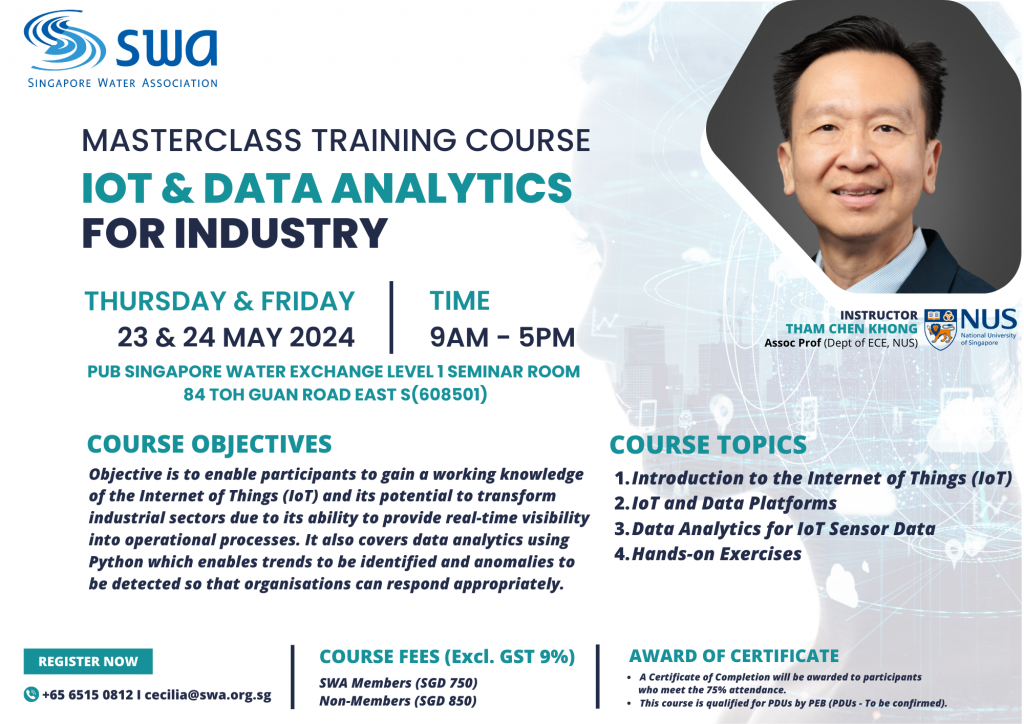[Training] Internet of Things and Data Analytics for Industry, 23 & 24 May 2024, 9am ~ 5pm
Date: 23rd & 24th May 2024
Time: 9am - 5pm
Venue: PUB Singapore Water Exchange, Seminar Room Level 1
[CLASSROOM TRAINING]
Course Title: Internet of Things and Data Analytics for Industry
Date: 23 & 24 May 2024 (Thurs/Fri)
Time: 9.00 am – 5.00 pm
Venue: PUB Singapore Water Exchange, Seminar Room Level 1
Instructor: Assoc Prof THAM Chen Khong, Dept of ECE, NUS
Dear SWA Members & Partners,
Singapore Water Association will be organising a 2-day in-person training class on the Internet of Things and Data Analytics for Industry on 23 & 24 May 2024.
Course Objectives
The objectives of this course are to enable participants to gain a working knowledge of the Internet of Things (IoT) and its potential to transform industrial sectors due to its ability to provide real-time visibility into operational processes. It also covers data analytics using Python which enables trends to be identified and anomalies to be detected so that organisations can respond appropriately.
Learning Outcome
- Be informed about the state-of-the-art in IoT devices and technologies
- Understand the key technological building blocks of IoT devices, such as sensors, wireless networking, embedded and distributed processing
- Understand IoT data aggregation and analytics architectures using edge, fog and cloud computing
- Appreciate the features found in modern IoT data processing platforms
- Learn about data analytics algorithms for analysing real-time IoT data and data sets
- Gain experience in applying data analytics algorithms on IoT data to develop actionable insights based on an industry case study
Target Audience
Beginners and experienced participants from the industry and Government.
Course Topics
- Introduction to the Internet of Things (IoT)
- Sensors, low-energy embedded systems, and smart meters
- Wireless communication protocols, e.g. LoRa, NB-IoT, 5G and IoT
- Information processing at the edge and cloud; digital twin
- Industry use cases
- IoT and Data Platforms
- Data collection, storage, query, analysis and applications (platform examples: ThingWorx, MindSphere, Azure)
- Data Analytics for IoT Sensor Data
- Data analytics techniques: regression, clustering, and classification using logistic regression and support vector machine (SVM)
- Data modelling of time-series sensor data
- Anomaly detection from time-series sensor data, exemplified in a predictive maintenance scenario
- Hands-on Exercises
- Participants will analyse sensor data using the Python programming language which is widely used in industry. You will derive insights, detect anomalies and predict events. The necessary data sets and computer code will be provided to participants.
Course Fee
Course Fee (Excl. GST 9%):
– SWA Member (SGD 750)
– Non-Member (SGD 850)
Award of Certificate
1. A Certificate of Completion will be awarded to participants who meet the 75% attendance.
2. This course is qualified for PDUs by PEB (PDUs – To be confirmed).
To confirm a place for this training, please register online REGISTRATION FORM by 30th April 2024.
For further enquiries, please feel free to contact Ms Cecilia Tan at Tel: 65150812 / 91778477 or email cecilia@swa.org.sg
About the Trainer:
Instructor: Associate Professor Tham Chen Khong, Dept of ECE, NUS
Tham Chen Khong is an associate professor at the Department of Electrical and Computer Engineering (ECE) of the National University of Singapore (NUS). His research and training activities are in the areas of IoT sensor data analytics, wireless mobile computing and machine learning algorithms and architectures. He has working experience at A*STAR Institute for Infocomm Research (I2R) and Accenture. He has led a number of research projects funded by NRF, A*STAR and MOE, Singapore, as well as consultancy projects with industry. He obtained his Ph.D. and M.A. degrees in Electrical and Information Sciences Engineering from the University of Cambridge, United Kingdom, and is a senior member of the IEEE.

![[Training] Internet of Things and Data Analytics for Industry, 23 & 24 May 2024, 9am ~ 5pm](https://www.swa.org.sg/wp-content/uploads/2017/03/about-us-banner.jpg)
